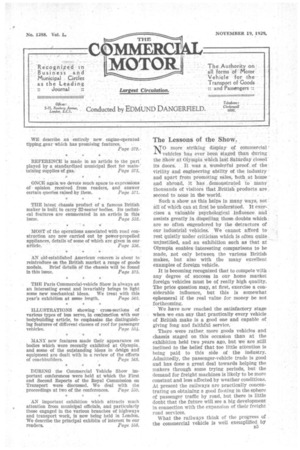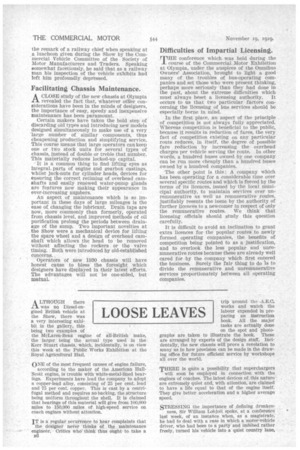WE describe an entirely new engine-operated tipping gear which has promising features.
Page 39

Page 40

If you've noticed an error in this article please click here to report it so we can fix it.
REFERENCE is made in an article to the part played by a standardized municipal fleet for main
taming supplies Of gas. Page 575..
ONCE again we devote much space to expressions of opinion received from readers, and answer
certain queries raised by them. Page 571.
THE latest chassis product of a famous British maker is built to carry 32-seater bodies. Its technical feattres are enumerated in an article in this issue. Page 552.
MOST of the operations associated with road construction are now carried out by power-propelled appliances, details of some of which are given in our
artide. Page 556.
AN old-established American concern is about to ' reintroduce on the British market a range of goods models. Brief details Of the ehassis will be found
in this issue. Page .575.
THE Paris Commercial-vehicle Show is always an an interesting event and invariably brings to light some new mechanical ideas. We treat with this
year's exhibition at some length. Page 562.
ILLUSTRATIONS showing cress-sections of various types of bus serve, in conjunction with our bodybuilding article, to emphasize the distinguishing features of different classes of roof for passenger
vehicles. Page 554.
MANY new features made their appearance on bodies which were recently exhibited at Olympia. and some of the outstanding ideas in design and equipment are dealt with in a review of the efforts
of coachbuilders. Page 568.
DURING the Commercial Vehicle Show important conferences were held at which the First and Second Reports of the Royal Commission on Transport were discussed. We deal with the
proceedings at two of the conferences. Page .550.
AN important exhibition which attracts much attention from municipal officials, and particularly those engaged in the various branches of highways and transport work, is now being held in London. We describe the principal exhibits of interest to our readers. Page 5,58.
The Lessons of the Show.
• NO more striking display of comniercial.' vehicles has ever -been staged than during . the Show at Olympia which bit Saturday closed its doors. It was a wonderful Lproof of the . Virility and engineering ability of the industry' and apart from promoting sales, both at home ' and abroad, it has demonstrated to many thousands of visitors that _British products are , second to none in the world.
Such a show as this helps in many ways, not all of which can at first be understood. It exercises a valuable psychological infhience and assists greatly in dispelling those doubts which are so often engendered by the detractors of our industrial vehicles. We cannot afford to rest quietly under criticism which is often quite unjustified, and an exhibition such as that at Olympia enables interesting comparisons to be made, not only between the various British makes, but also with the many excellent examples of foreign vehicle.
It is becoming recognized that to compete with any degree of success in our home market foreign vehicles must be of really high quality. The price question may, at first, exercise a considerable influence, but this is somewhat ephemeral if the real value for money be not forthcoming.
We have now reached the satisfactory stage when we ean say that practically every vehicle of British make is a good one and capable of giving tong and faithful service.
There were rather more goods vehicles and chassis staged on this occasion than at the exhibition held two years ago, but we are still inclined to the belief that too little attention is being paid to this side of the industry. Admittedly, the passenger-vehicle trade is good and has done a great deal towards helping the makers through some trying periods, but the demand for freight machines is likely to be more constant and less affected by weather conditions. At present the railways are practically concentrating on obtaining a good footing in the sphere of passenger traffic by road, but there is little doubt that the future will see a big development in connection with the expansion of their freight road services.
What the railways think of the progress of the commercial vehicle is well exemplified by the remark of a railway chief when speaking at a luncheon given during the Show by the Commercial Vehicle Committee of the Society of Motor Manufacturers and Traders. Speaking somewhat facetiously, he said that as a railway man his Inspection of the vehicle exhibits had left hiin profoundly deprbssed.
Facilitating Chassis Maintenance.
ACLOSE study of the new chassis at Olympia revealed the fact that, whatever otlier considerations have been in the minds of designers, the importance of easy, speedy and inexpensive maintenance has been paramount.
Certain makers have taken the bold step of discarding old types and introducing new models designed simultaneously to make use of a very 'large number of similar components, thus cheapening production and simplifying service. This course means that large operators can keep one or two stock units for several types of chassis, instead of double or treble that number. This materially reduces locked-up capital.
-It is a common thing to find lifting eyes as Integral. parts of engine and gearbox castings, whilst jack-nuts for cylinder heads, devices for epsuring the correct reaming of overhead camshafts and easily renewed water-pump glands are features now making their appearance in ever-increasing nusrabers.
An aspect of maintenance which is so important in these days of large mileages is the ease of changing the lubricant. Drain taps are now, more commonly than formerly, operated from chassis level, and improved methods of oil purification prolong the periods between drainage of the sump. Two important novelties at the Show were a mechanical device for lifting the spare wheel and a design of overhead camshaft which allows the head to be removed without affecting the rockers or the valve timing. Both were introduced by old-established concerns.
Operators of new 1930 chassis will have honest cause to bless the foresight which designers have displayed in their latest efforts. The advantages will not be one-sided, but mutual.
Difficulties of Impartial Licensing.
THE conference which was held during the course of the Commercial Motor Exhibition at Olympia, under the auspices of the Omnibus Owners' Association, brought to light a good many of the troubles of bus-operating companies and set those who were present thinking, perhaps more seriously than they had done in the past, about the extreme difficulties which must always beset a licensing authority. It occurs to us that two particular factors concerning the licensing of bus services should be especially borne in mind.
In the first place, an aspect of the principle of competition is not always fully appreciated. Whereas competition is beneficial to the public, because it results in reduction of fares, the very fact of competition existing on any particular route reduces, in itself, the degree of possible fare reduction by increasing the overhead charges per vehicle serving the route. In other words, a hundred buses owned by one company can be run more cheaply than a hundred buses owned by a hundred companies.
The other point is this : A company which has been operating for a considerable time over several specific routes and which is forced by the terms of its licences, issued by the local municipal authority, to maintain services over unremunerative as well as remunerative routes, justifiably resents the issue by the authority of further licences to a newcomer in respect of only the remunerative routes. We think that licensing officials should study this question carefully.
It is difficult to avoid an inclination to grant extra licences for the popular routes to newly formed operating companies, the benefits of competition being pointed to as a justification, and to overlook the less popular and unrenaunerative routes because these are already well cared for by the company which first entered the business. Surely the fair thing to do is to divide the remunerative and unremunerative services proportionately between all operating companies.




















































































































